Suchergebnisse
Business Treff: Sustainable Food Systems
21. Juni 2023, 16:30 – 19:30 Uhr
weXelerate, Praterstraße 1, 1020 Wien
Lebensmittelsysteme sind Verursacher, aber zugleich Opfer aktueller Entwicklungen und jüngster Krisen. Das Austria Wirtschaftsservice mit der sich im Ausbau befindenden „aws Sustainable Food Systems Initiative“ und die Wirtschaftsagentur Wien richten den Fokus auf den Themenkomplex „Sustainable Food Systems.
Konzeptentwicklung und Vorbereitung eines Wiener Innovationslabors zur Beschleunigung am Weg zur Klimaneutralität (Klima Hub Wien)
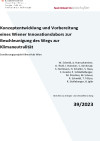
Vorbereitung eines urbanen Innovationslabors zur Unterstützung der Dekarbonisierung in Wien bis 2040. Gesetzt wird auf systemische Innovation und beschleunigten Roll-out von FTI-Vorhaben durch Infrastruktur, Dienstleistungen, Vernetzung und die systematische Einbindung von Stadtverwaltung und Nutzer:innen. Das Innovationslabor soll die Wirksamkeit von Innovationen und die Teilhabe der Wiener:innen an der Transformation stärken.
Schriftenreihe
39/2023
W. Schmid, A. Harrucksteiner, G. Thell, I. Homeier, C. Kirchmair, S. Hartmann, H. Scheller, S. Haas, F. Kesicki, P. Schließelberger, M. Pöschko, M. Schnur, R. Schmidt, T. Tötzer, R. Stollnberger, B. Iglár
Herausgeber: BMK
Deutsch, 41 Seiten
Downloads zur Publikation
HPZ-Mauerwerk - Dämmstofffreie High-Performance-Außenwand aus Ziegelmauerwerk
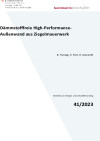
Um nachhaltige Quartiere in Ziegelbauweise realisieren zu können, muss die Festigkeit des thermisch optimierten Hochlochziegels verdreifacht werden. Dies soll durch Veränderung des Lochbilds, nämlich durch Verkleinerung des Luftspalts von 8 auf 4 mm gelingen. Ein erfolgreicher Projektabschluss bildet die Basis für dämmstofffreie, 8-geschossige Wohn- und Bürogebäude in Ziegelbauweise.
Schriftenreihe
41/2023
B. Freytag, H. Ferk, H. Gamerith
Herausgeber: BMK
Deutsch, 38 Seiten
Downloads zur Publikation
Renewable resources in the building sector

Investigation of factors which support and hinder acceptance: Technical, legal/political and organisational levels considered, focus on innovative solutions with high market potential, thematic focal areas: straw bale building, surface treatment, acoustic and thermal insulation
Österreichischer Technologiebericht 1999

Hintergrundinformationen über die Entwicklung zentraler Indikatoren betreffendForschung, Entwicklung und Innovation, den Stand der technologischen Leistungsfähigkeit,Trends in der Verbreitung neuer Technologien und den ökonomischen Effekten dieserTechnologien.
Deutsch
Research Agenda "Biobasierte Industrie"

Möglichkeiten und Chancen für die Umstellung der österreichischen Industrie von einer auf fossilen Rohstoffen basierten Wirtschaftsweise auf die Erzeugung von hochwertigen Produkten auf Basis von biogenen Rohstoffen.
Mehrsprachig
Das Sahel-Projekt
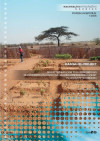
Silikattechnologie zur Verbesserung der Wasseraufnahme und Nährstoffspeicherfähigkeit in Grenzertragsböden
Forschungsforum
1/2006
Herausgeber: BMVIT
Deutsch, 6 Seiten
Downloads zur Publikation
Bauteilentwicklung für Lehm - Passivhäuser

Entwicklung von großflächigen, geschosshohen Baumodulen aus nachwachsenden Rohstoffen (Holz, Stroh, Hanf u.a.) und Lehmbaustoffen als Zulieferteile für den Bau von Passivhäusern.
Contracting as a instrument for renovation

Development of contracting models for comprehensive renovation service packages.
Berichte aus Energie- und Umweltforschung 14/1996 PREPARE Oberösterreich

Ergebnisse und Begleitforschung im Rahmen des oberösterreichischen PREPARE-Projektes
EU-Ökodesign Verordnung (2024)

Die Verordnung (EU) 2024/1781 vom 13. Juni 2024 schafft einen Rahmen für die Festlegung von Ökodesign-Anforderungen für nachhaltige Produkte und ersetzt die Richtlinie 2009/125/EG. Diese Verordnung ist Teil einer umfassenderen EU-Strategie, die mehrere zentrale EU-Politiken und Initiativen integriert.
Herausgeber: Europäische Kommission
Deutsch
Zukunft Kreislaufwirtschaft?
13. November 2024, 17:30 - 19:00 Uhr
APA-Pressezentrum, Laimgrubengasse 10, 1060 Wien und Online
Expert:innenpodium diskutiert Wege zur klimaneutralen Wirtschaft
Smart Pölten 2.0 - Ganzheitliche Betrachtung einer Vertical Farm in Vorbereitung eines Demonstrationsprojektes in St. Pölten
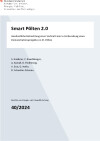
Die Stadt St. Pölten sieht in Vertical Farming großes Potential hinsichtlich der Ziele des Smart City-Konzeptes durch die Verknüpfung von lokaler Lebensmittelproduktion, Lebensqualität und Reduktion des Ressourcenverbrauchs. Um dieser Zielsetzung gerecht zu werden sollen Vertikale Farmen an Bestandsgebäuden entwickelt werden. Öko-soziale und sozio-ökonomische Betrachtungen spielen hierbei mit eine tragende Rolle.
Schriftenreihe
40/2024
S. Haiderer, C. Rauchberger, A. Kumpf, D. Podmirseg, V. Enzi, G. Hofer, D. Schneller-Scharau
Herausgeber: BMK
Deutsch, 149 Seiten
Downloads zur Publikation
Klimaneutrales St. Veit 2040
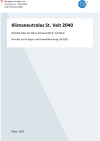
Klimafahrplan der Klima-Pionierstadt St. Veit/Glan
Schriftenreihe
34/2025
Anna Köstinger, Johann Daxbeck, Barbara Lepuschitz
Herausgeber: BMIMI
Deutsch, 26 Seiten
Downloads zur Publikation
Living-city Joint-space-potential Salzburg
Exemplary transformation of a traffic abused open urban structure. The target was to develop a model through supplementary housing as well as social measures and measures for the surrounding.
FT-Treibstoffe aus Biomasse in Österreich
Entwicklung eines realisierbaren Konzeptes zur Herstellung von Fischer-Tropsch Treibstoffen aus Biomasse in Österreich in einer Größenordnung von 200.000 to/a. Prüfung technischer Varianten sowie Evaluierung der verfügbaren Biomasseressourcen, der ökonomischem Sinnhaftigkeit und des ökologischen Nutzens.
Pilot project gaining-building-land Pongau
Gaining extra space for additional households through sustainable renovation and/or extension of 8 detached houses by integrating consulting, planning, energy efficiency concepts and financing.
Energiespar-Contracting-Plattform für KMU
Evaluierung der Voraussetzungen und Rahmenbedingungen zur Einführung und für den Betrieb einer Energiespar-Contracting-Plattform für Klein- und Mittelbetriebe (KMU) in Österreich zur effizienten Identifikation und Umsetzung von Energiesparmaßnahmen.
ÖGUT-Umweltpreis 2008 verliehen
Am 26. November 2008 wurde zum 23. Mal der ÖGUT-Umweltpreis verliehen. In der Kategorie "Nachwachsende Rohstoffe und ressourceneffiziente Produktionsprozesse" wurde die Entwicklung eines Biofaserlehm-Trockenbausystems ausgezeichnet. Zwei Forschungsprojekte der Programmlinie Fabrik der Zukunft waren in engster Auswahl.
ÖGUT Umweltpreis 2012 gestartet
Auch dieses Jahr sucht die ÖGUT herausragende Projekte im Bereich Umwelt, Nachhaltigkeit und Gesellschaft, um sie mit dem Umweltpreis auszuzeichnen. Die neue Kategorie "Neue Ausbildungswege für innovative Energietechnologien" spricht dabei Projekte aus dem Aus- und Weiterbildungsbereich an.
